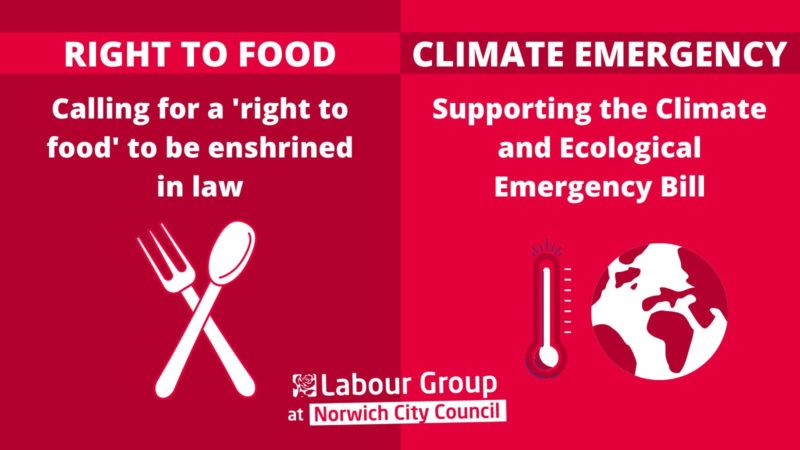
At tonight’s meeting of full council, Labour Group at Norwich City Council will be proposing motions on the Right to Food and the Climate and Ecological Emergency Bill. You can read the full text of these motions at the foot of this page.
![]() Our #RightToFood motion calls for this right to be incorporated into the Government’s National Food Strategy, so there is clear governmental responsibility for this provision.
Our #RightToFood motion calls for this right to be incorporated into the Government’s National Food Strategy, so there is clear governmental responsibility for this provision.
![]() Our Climate and Ecological Emergency Bill motion notes that the current national target of net zero by 2050 does not go far enough. We support the CEE Bill, which would see the government have to devise a robust emergency strategy to deal with the climate crisis.
Our Climate and Ecological Emergency Bill motion notes that the current national target of net zero by 2050 does not go far enough. We support the CEE Bill, which would see the government have to devise a robust emergency strategy to deal with the climate crisis.
Right to Food
Proposer: Cllr Jacob Huntley
Seconder: Cllr Karen Davies
The current National Food Strategy (NFS) review, the first since that commissioned
by the post-war Labour government, represents a rare opportunity to influence the
approach, practices, and direction of future food planning. Alongside addressing
acute food poverty, including child hunger, this strategic review must call for a
fundamental ‘right to food’, to be enshrined in law, thereby ensuring that government
obligations on food poverty are clear and government bodies can be held to account
for violations of this right, as argued for by the Right to Food campaign in order to
address the 11 million U.K. residents experiencing food poverty.
The recommendations outlined in Part 1 of the NFS report include:
1) expanding the eligibility for the Free School Meal scheme to include every child (up
to the age of 16) from a household where the parent or guardian is in receipt of
Universal Credit or equivalent benefits
2) extending the Holiday Activity and Food programme to all areas of England, so that
summer holiday support is available to all children in receipt of free school meals
3) increasing the value of the Healthy Start vouchers to £4.25 per week, and expand the
scheme to every pregnant woman and to all households with children under four
where a parent or guardian is in receipt of Universal Credit or equivalent benefits
4) the support of supermarkets and convenience stores (with the support from the
Association of Convenience Stores) in supplementing these vouchers with additional
free fruit and vegetables
This council RESOLVES to:
1) Call on the Chair of the National Food Strategy, Henry Dimbleby, to
recommend in addition:
a) for a ‘right to food’ to be established in law, thereby ensuring a
recognisable governmental responsibility for this provision.
b) that accessibility to the Free School Meal scheme is given equal
importance as eligibility (so that digital poverty doesn’t precipitate food
poverty)
c) that accessibility to the Holiday Activity and Food programme is given
equal importance as eligibility (so that digital poverty doesn’t preclude
participation and precipitate food poverty)
d) raising the value of the Healthy Start vouchers to £5.00.
e) that all food for sale in the U.K. on reaching its ‘best before date’ is
automatically donated for distribution through delivery networks such as
foodbanks.
f) that all local schemes encouraging environmentally sustainable food
production, including communal allotments or appropriate foods grown in
communal areas, be eligible to funding drawn from tariffs imposed upon
products not meeting the standards of certification schemes covering
animal welfare, environmental and climate protections as outlined in
recommendation 5.
2) Ask the Lord Mayor to write to thank those local supermarkets and
convenience stores actively donating food for distribution through local
delivery networks such as foodbanks to Norwich residents.
3) Ask the Leader of the council to write to the relevant Secretary of State urging
the National Food Strategy recommendations
Climate and Ecological Emergency Bill
Proposer: Cllr Matthew Packer
Seconder: Cllr Adam Giles
Humans have already caused irreversible climate change, the impacts of which are
being felt in the UK and around the world. Global temperatures have increased by 1
degree Celsius from pre-industrial levels. Atmospheric CO2 levels are above 400
parts per million (ppm) and continue to rise—this far exceeds the 350 ppm deemed
to be a safe level for humanity. Without more significant and sustained action, the
world is set to exceed the Paris Agreement’s 1.5°C limit between 2030 and 2040.
This council:
1. Notes, that the current UK target of net zero by 2050 is not satisfactory. It is too
little too late. The increase in harm caused by a rise of 2°C rather than 1.5°C is
significant. This is described by the Intergovernmental Panel on Climate
Change’s Special Report on Global Warming of 1.5°C published in October 2018.
According to the IPCC, limiting heating to 1.5°C may still be possible with
ambitious action from national and sub-national authorities, civil society, the
private sector, and local communities. This action requires appropriate resources
from central government to enable cities, like Norwich, to deliver the change
needed to avoid the worst impacts of climatic change and to drive a sustainable
and socially just post Covid-19 recovery.
2. Recognises once again that the evidence is clear. The costs of failing to address
this crisis will far outstrip the investments required to prevent it. Investing now will
bring many benefits in the form of good jobs, breathable cities and thriving
communities.
3. Notes that many local authorities are playing an important role in the UK taking
action to achieve net zero
4. Notes that there is a Bill before Parliament—the Climate and Ecological
Emergency Bill (published as the Climate and Ecology Bill)—according to which
the UK Government must develop an emergency strategy that:
a) requires that the UK plays its fair and proper role in reducing greenhouse gas
emissions consistent with limiting global temperature increase to 1.5 degrees
Celsius above pre-industrial temperatures;
b) ensures that all the UK’s consumption emissions are accounted for;
c) includes emissions from aviation and shipping;
d) protects and restores biodiverse habitats along overseas supply chains;
e) restores and regenerates the UK’s depleted soils, wildlife habitats and species
populations to healthy and robust states, maximising their capacity to absorb
CO2 and their resistance to climate heating
f) builds on the findings of the parliament’s climate assembly, to engage further
with the UK Government to help develop the emergency strategy.
Council therefore RESOLVES to:
1) Support the Climate and Ecological Emergency (CEE) Bill;
2) Inform the local media of this decision;
3) Write to local Members of Parliament, asking them to support or thanking
them for supporting the CEE Bill; and
4) Write to the CEE Bill Alliance, the organisers of the campaign for the Bill,
expressing its support (campaign@ceebill.uk)

